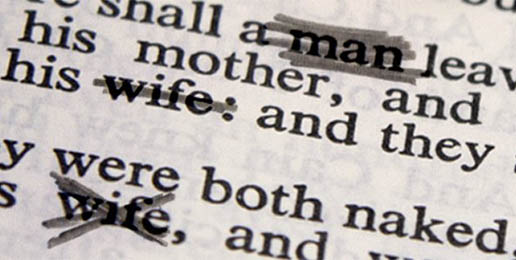
Written by Alan Shlemon
Two thousand years ago, Paul sounded a warning to his protégé Timothy. He said that a time will come when people will no longer “endure sound doctrine; but wanting to have their ears tickled, they will accumulate for themselves teachers in accordance to their own desires, and will turn away their ears from the truth and will turn aside to myths” (2 Tim. 4:3-4).
Paul’s warning 2,000 years ago is still relevant today. Many Christians are turning to the myth of pro-gay theology, the belief that Scripture can be interpreted to be gay-affirming.
Early advocates of pro-gay theology invented arguments that were easily refuted. They claimed that David and Jonathan were gay, that Jesus and John (the “disciple whom Jesus loved”) were homosexual lovers, and that according to Isaiah 53:8 Jesus was a eunuch (“cut off,” castrated). These types of claims have been abandoned in favor of more modern arguments.
The new approach is to claim that the Bible does condemn homosexuality, but only abusive or exploitive homosexual acts. Scripture, they say, prohibits homosexual gang rape (i.e. Sodom and Gomorrah), pederasty (men who have sex with boys), master-slave sodomy, and other coercive same-sex acts. Since homosexuals today don’t engage in those kinds of abusive behaviors, the biblical prohibitions of homosexuality don’t apply to them.
That sounds clever, and unfortunately, many believers are buying it. This reinterpretive approach, though, is undermined in one step.
If you can show that any biblical passage categorically condemns all forms of homosexual sex (and not just abusive forms), then this new approach to pro-gay theology is mistaken. It turns out that all five passages that directly address homosexuality (Lev. 18:22, 20:13; Rom. 1:26-27; 1 Cor. 6:9; 1 Tim. 1:10) entail a wholesale prohibition of all forms of homosexual sex.
Take Leviticus 18:22, for example. It simply reads, “You shall not lie with a male as one lies with a female; it is an abomination.” The verse before it condemns child sacrifice, and the verse after it condemns bestiality. Nowhere in the context is there an indication that any particular type of homosexual sex is in view, and no exception is made for loving, consensual homosexual relationships. The verse categorically condemns all same-sex sexual behavior.
The same is true with the almost identical verse in Leviticus 20:13, which says, “If there is a man who lies with a male as those who lie with a woman, both of them have committed a detestable act; they shall surely be put to death. Their bloodguiltiness is upon them.” Notice that both participants are punished, which indicates this is a consensual act, not coercive.
Had Leviticus been referring to homosexual gang rape, master-slave sodomy, or some other coercive act, only one of the men would have been punished. In Deuteronomy 22:25-26, for example, if a man rapes a woman, then the aggressor alone is put to death. Since he is forcing himself on another person, this instance of sexual activity is coercive. In the case of homosexual sex in Leviticus, though, both men are punished because they mutually engage in the act.
Don’t misunderstand me, though. I’m not claiming homosexual sex is a sin today because it’s forbidden in Leviticus. The Mosaic Law was written for Israel’s theocracy, which we are no longer under. My point is to show that the attempt to reinterpret the Bible in this way is mistaken. Besides, the prohibition of homosexual sex is carried over into the New Testament and under the New Covenant of Christ in three of Paul’s epistles.
In Romans 1:26-27, for example, the Bible teaches a wholesale prohibition of all forms of homosexual sex. Starting in verse 18, Paul places his comments about same-sex behavior in the context of a creation narrative. He doesn’t specify the type of homosexual sex that’s in view here, though. On the contrary, he points out that all homosexual sex abandons the male-female complementarity God established in the Genesis creation account. “Men,” Paul writes, “abandoned the natural function of women and burned in their desire toward one another, men with men committing indecent acts….” They rejected the women God designed for them. Homosexual sex exchanges the natural male-female sex for unnatural male-male or female-female sex—what Paul called an “indecent act.”
It’s worth noting that the behavior Paul describes is “toward one another, men with men,” indicating mutual, consensual, non-exploitive, reciprocal affection. Also, verse 26 mentions lesbianism, which was not exploitive in Paul’s time. Indeed, by listing both males and females as violating this complementarity, Paul condemns all homosexual behavior.
Of course, 1 Corinthians 6 and 1 Timothy 1 also categorically reject all types of homosexual sex. All that’s needed, though, is to show that just one passage makes that point clear, which we’ve shown at least three do. Therefore, the modern case for pro-gay theology fails. It’s an example of how people “turn away their ears from the truth” and reinterpret the Bible to fit their desires.
Article originally published at STR.org.





























